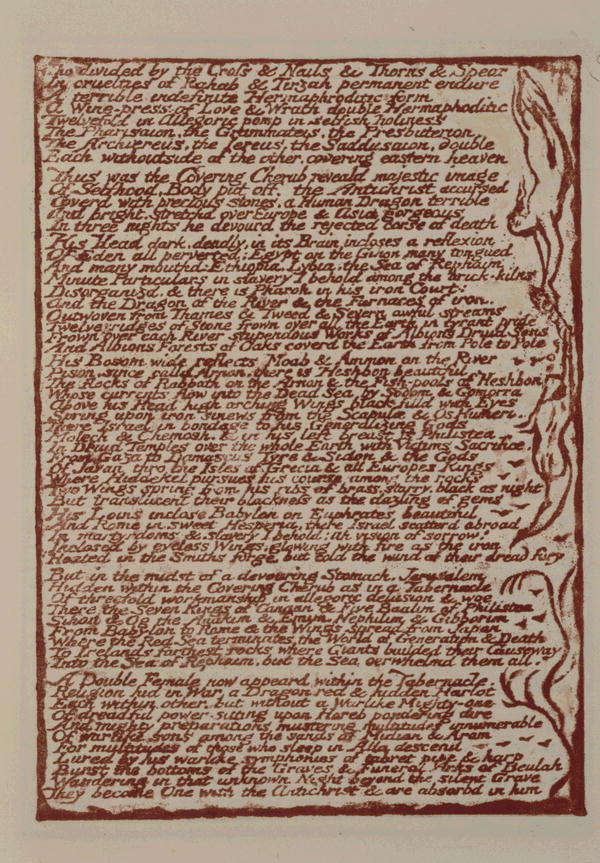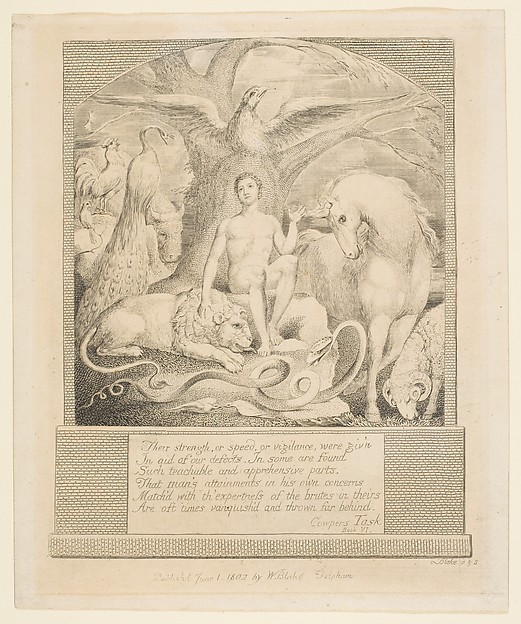"Every thing possible to be believ'd is an image of truth."
Blake's work was creating images. His Imagination was his connection with the Infinite. What he received through his senses from the outer world was processed by his mind as images. He received as data: material objects, events, relationships, individuals. But the reality of each thing he knew to be in his mind. Until his mind, through his imagination, created an image from the data, it was not true.
Jerusalem, Plate 4, (E 147)
"I rest not from my great task!
To open the Eternal Worlds, to open the immortal
Eyes Of Man inwards into the Worlds of Thought: into Eternity
Ever expanding in the Bosom of God. the Human Imagination"
From the raw data which he gathered with an eclectic appetite he created a multitude of images to feed the minds of his readers with ideas and open their imaginations to the 'Perception of the Infinite'.
 |
| British Museum Study for Blair's The Grave |
Milton, Plate 37 [41], (E 138)
"but the Fires of Los, rage
In the remotest bottoms of the Caves, that none can pass
Into Eternity that way, but all descend to Los
To Bowlahoola & Allamanda & to Entuthon Benython"
Kay and Roger Easson's book Milton: A Poem by William Blake yields further guidance on understanding Blake's terminology and his complex concepts:
"Los is called Time, and we learn in Milton that his hammers are the beating heart, the bellows of his forge are the lungs, and his furnaces are the stomach. For Blake, then, time is a function of pulsation, the rhythmic pounding of the heart, the rhythmic surge of air in the lungs, and the rhythm of digestion in the stomach and intestines. The sensation of the passage of time is inherent in the pulse which pervades the tissues of the body. Los is the poet/ prophet who perceives the rhythms in life, witnesses to the truth that "Time is the mercy of Eternity; without Times swiftness / Which is the swiftest of all things: all were eternal torment." Page 144
Milton, Plate (E 120)
Arise O Sons give all your strength against Eternal Death
Lest we are vegetated, for Cathedrons Looms weave only Death
A Web of Death: & were it not for Bowlahoola & Allamanda
No Human Form but only a Fibrous Vegetation
A Polypus of soft affections without Thought or Vision
Must tremble in the Heavens & Earths thro all the Ulro space[.]
Throw all the Vegetated Mortals into Bowlahoola
But as to this Elected Form who is returnd again
He is the Signal that the Last Vintage now approaches
Nor Vegetation may go on till all the Earth is reapd
So Los spoke. Furious they descended to Bowlahoola & Allamanda
Indignant. unconvincd by Los's arguments & thun[d]ers rolling
They saw that wrath now swayd and now pity absorbd him
As it was, so it remaind & no hope of an end.
Bowlahoola is namd Law. by mortals, Tharmas founded it:
Because of Satan, before Luban in the City of Golgonooza.
But Golgonooza is namd Art & Manufacture by mortal men.
In Bowlahoola Los's Anvils stand & his Furnaces rage;
Thundering the Hammers beat & the Bellows blow loud
Living self moving mourning lamenting & howling incessantly
Bowlahoola thro all its porches feels tho' too fast founded
Its pillars & porticoes to tremble at the force
Of mortal or immortal arm: and softly lilling flutes
Accordant with the horrid labours make sweet melody-
The Bellows are the Animal Lungs: the hammers the Animal Heart
The Furnaces the Stomach for digestion. terrible their fury
Thousands & thousands labour. thousands play on instruments
Stringed or fluted to ameliorate the sorrows of slavery
Loud sport the dancers in the dance of death, rejoicing in carnage
The hard dentant Hammers are lulld by the flutes['] lula lula
The bellowing Furnaces['] blare by the long sounding clarion
The double drum drowns howls & groans, the shrill fife. shrieks & cries:
The crooked horn mellows the hoarse raving serpent, terrible, but harmonious
Bowlahoola is the Stomach in every individual man."
Bowlahoola
includes the stomach but also includes the whole digestive and
respiratory systems which provide the energy for the operation of
the body. The Eassons tell us that 'Allamada involves
communication, learning, and the exchange of ideas - the continual
ideas of mental harvest.' As a system of the body, 'Allamada is
the nervous system.' Damon calls Entuthon Benython 'the physical
frame of the generated man' but Frye sees in Entuthon Benython, a
pathless forest outside of Golgonooza.The Body & Soul are a unity, understanding the Body is tatamount to understanding the Soul.
Marriage of Heaven & Hell, Plate 4, (E 34)
"But the following Contraries to these are True
1 Man has no Body distinct from his Soul
for that calld Body is a portion of Soul discernd
by the five Senses. the chief inlets of Soul in this
age
2. Energy is the only life and is from the Body
and Reason is the bound or outward circumference
of Energy.
3 Energy is Eternal Delight"










